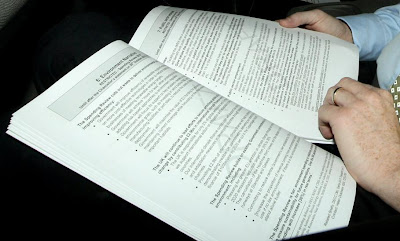Date: Tue, 5 Oct 2010
Subject: IMPORTANT - Dear Colleague from the Chancellor of the Exchequer
Dear Colleague,
I wanted to take this opportunity to give you some more information about the two announcements on welfare spending that I made in my conference speech.
We all know that the unprecedented scale of the mess that Labour left behind means this Government will have to take some very tough decisions about public spending. The Conservative Party has been here before and we have always risen to the challenge of rebuilding our public finances.
But in order to sustain public support for the difficult choices ahead I believe that we must show people that our approach is not only tough but is also fair. That means showing that those at the higher end of the income scale are also affected by the measures we take.
The first announcement I made yesterday was that from 2013 we will withdraw child benefit from around 1.2 million households containing a higher rate taxpayer, saving around £1 billion a year. The other 85 per cent of families, 6.6 million in total, will continue to receive child benefit as they do today.
As I said in my speech, I understand that most higher-rate taxpayers are not the super-rich, but at a time like this it is very difficult to justify taxing people on lower incomes to pay £1 billion in benefits to households that contain higher rate taxpayers.
To put this saving in context, in the Budget I made £11 billion of savings from other parts of the welfare system, many of which affected people on lower incomes.
I know some have pointed out that this approach will leave households that do not contain a higher rate taxpayer, but whose joint income is above the higher rate threshold, still in receipt of child benefit. The only way to assess these joint income families would be to create a new complex, costly and intrusive means test that would spread right up the income distribution.
 Effectively that would mean abolishing child benefit, which is one of the simplest and cheapest benefits to administer, and bringing every family in the country into a new tax credits system, with families having to provide details of their household income every year. Colleagues will be all too familiar with the drawbacks of Gordon Brown’s tax credits system and I do not believe that would be the right approach.
Effectively that would mean abolishing child benefit, which is one of the simplest and cheapest benefits to administer, and bringing every family in the country into a new tax credits system, with families having to provide details of their household income every year. Colleagues will be all too familiar with the drawbacks of Gordon Brown’s tax credits system and I do not believe that would be the right approach.It is also important to note that we are not introducing a new principle to the tax and benefit system; at the moment a single earner on £50,000 pays higher rate tax while a two-earner couple earning £40,000 each do not.
And as David Cameron pointed out this morning, we should not see this policy in isolation. Other policies contained in the Coalition Agreement will help families, including our commitment to introduce transferable allowances for married couples.
Crucially, I do not believe that fairness is only defined across the income distribution. As I said in my speech, if the welfare state is going to regain the trust of the British people, it needs to reflect the British sense of fair play.
That is why I have also announced that for the first time we will introduce from 2013 a limit on the total amount of benefits any one family can receive, saving hundreds of millions of pounds.
The limit will be set according to this very simple principle: unless they have disabilities to cope with and therefore receive Disability Living Allowance, no family should get more from living on benefits than the average family gets from going out to work. By 2013 this is expected to be around £500 a week.
I believe that this measure will have strong support from the British people, and together with our transformative proposals for a new Universal Credit, it will help to ensure that work always pays.
I know that both these measures are tough, but they are also fair, and I believe that the public will perceive them as such. Our opponents pretend that difficult decisions can be avoided, but they are consigning themselves to the margins of British politics. This is a battle between the vested interests and the national interest. The Conservative Party has always been on the right side of that divide.
Please feel free to contact me or my PPS Greg Hands if you would like to discuss any of these issues further.
Yours ever,
George















